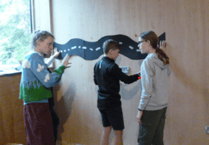CHINESE sky lanterns launched from a garden in Watchet sparked a series of 999 calls and almost led to lifeboat and coastguard teams being called out after they were mistaken for distress flares.
The emergency services 'scramble' late last Saturday night was only avoided because local coastguard officer Simon Bale spotted the lights on his way home.
He immediately contacted coastguard control in Swansea, who had received a 999 call at about 11.15pm reporting possible flares in the Helwell Bay or Doniford area.
Mr Bale was able to tell control room staff that the flares were nothing more than Chinese lanterns - about 14 in total - being launched from the Reed Close area of the town.
Only two days earlier, coastguard search and rescue teams from Watchet and both Minehead's lifeboats had been called out to search the shoreline east of Watchet following a similar sighting.
The crew of one of the lifeboats, on a training exercise, spotted what could have been two red flares at about 7.30pm.
In misty weather conditions the joint rescue services searched the St Audries Bay area for an hour, only calling off their hunt when they were confident that no vessels were in distress.
The exact source of the flares is still unknown but they are believed to have come from somewhere inland towards St Audries.
The glow from Chinese lanterns can be seen in the sky for up to 20 minutes and they can travel several miles, reaching altitudes of more than 2,000 metres.
Mr Bale said Thursday's exercise had been a good practical exercise between the agencies, with the lifeboat crews covering the water and the coastguards focusing on the shoreline and the cliff tops.
But he is now warning people living near the coast to notify the coastguard service ahead of lighting fires on beaches or launching fireworks and Chinese lanterns to avoid unnecessary call-outs.
He said if Saturday's sighting had been investigated it could have led to the launch of both lifeboats again, the call-out of coastguard teams and even the use of a search and rescue helicopter.
"This could have been an expensive and dangerous search as whenever the rescue services launch onto the water or on the shoreline there is an element of danger, and, of course, the cost to the RNLI as a charity and to the taxpayer for the services of the coastguard teams and helicopters."
Mr Bale said any unnecessary alerts could lead to the diversion of the emergency services from real rescues.
He added: "We always encourage any member of the public who sights any strange lights, or what they think is a flare, to inform the coastguard and the controllers will decide if they are possibly genuine or not."



